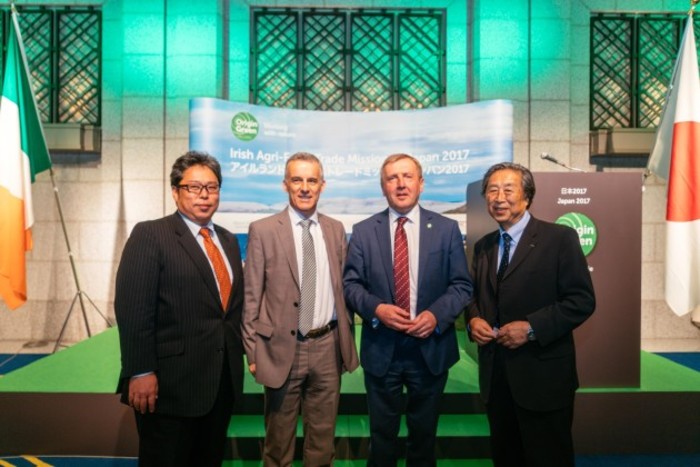How to hand over business cards in Japan - and other lessons for making it on trade trips
This company director delivers a masterclass in meeting customers overseas.
OVERSEAS TRADE TRIPS are a great opportunity for small business owners to research a potential new export market and press palms with future customers.
I’m on the other side of the world this week as a delegate on a government-organised trade mission to Japan and South Korea. Some 30 businesses are taking part.
The objective of the trip, which has been facilitated by Bord Bia and the Department of Agriculture, is to immerse myself in Asian business culture and see if there are any gaps in supermarkets and other outlets here for Glenstal Foods’ products.
This is my second such trade mission: I went on another state trip to the Middle East in 2014, where we visited the UAE and Saudi Arabia.
I’ve found that travelling as part of a ministerial-led delegation tends to open up a lot more doors and helps if you want to gain access to key decision makers in interesting markets.
The first port of call for a small food firm interested in scoping out a new export country is to make contact with Bord Bia.
The agency has a number of sector managers for different food groups like dairy and meat. Over the course of the year, they organise various sector-specific trade missions and market study visits.
 Gareth Coleman of Glenstal Foods
Gareth Coleman of Glenstal Foods
They do a lot of the ground work for trips in terms of scoping out opportunities and buyer introductions. They also organise events and seminars that you can invite prospective customers to.
We’ve paid our own way for this trip to Japan and South Korea, but I think the investment is worth it. You’re seen as more serious players when you travel on a ministerial trip.
Here’s an example: in 2010, I went to Dubai by myself. We had no business in the Middle East. After the 2014 trade mission, we opened an office in the city with two people.
Cultural differences
While electronic communication with customers is great, you can’t beat meeting them in person, especially if you’re new to an export market.
Face-to-face contact, handshakes, sharing a cup of coffee or having lunch together helps build relationships and strengthen bonds.
In-the-flesh contact also means you can pick up on different nuances. You can read a potential customer much better, and you have a better chance of pushing your point home than through email or a phone call.
 Coleman with agriculture minister Michael Creed
Coleman with agriculture minister Michael Creed
I think it’s how Irish companies can remain successful post-Brexit – we’re willing to get on a plane and travel to far-flung destinations and meet with a customer.
Before embarking on an overseas trade mission, it’s important to research the cultural differences between your respective countries.
There’s plenty of information available online and various government departments prepare dossiers to help business owners understand foreign markets.
There is usually a number of peculiar cultural differences that are worth bearing in mind when you’re networking overseas.
For example, here in Japan, people take great pride in presenting their business cards. They present it with two hands and will hold it in front of you so you can read it.
You have to take their business card, look at it for a moment and then place the card on the table in front of you or your wallet. You should never stuff a business card into your trouser pocket because it shows disrespect.
When you’re offered tea or food – even if you don’t like it – it’s important to be seen to enjoy the hospitality.
The Irish are well-known for the gift of the gab, but Japanese people will talk a little bit slower and will pause to consider what you’ve just said.
We’d find that a little unusual in western society because we’re so used to quick back and forths between ourselves and customers.
There are a number of small things like that which may be overlooked – but it’s crucial that you respect cultural differences if you want to have a successful trip.
Maintain contact
After meeting in the flesh, it’s important to maintain relationships with customers.
For example, we have an existing importer in Tokyo. We’ve met them this week. They’ll be coming to Paris in February for a trade show. If I’m anxious to keep pushing things along, then I should make time to meet them when they visit Europe in the new year.
It’s also important to maintain contact through email. You should keep your messages short and use plain English.
Overall, it’s important to be patient. My goal for this trip is to win new sales, but I don’t expect to come home with an immediate contract from new customers.
Some countries are slower to respond to offers than what we’re used to in Ireland. That can be a challenge for people who are new to exporting.
Even if correspondence with the other side grows cold – which can be a bit frustrating – it’s worth remembering that the slow response may simply be down to cultural differences.
If you try to be overly aggressive, you might jeoporadise a future deal. I still get emails from people I met three years ago – at the time, our product mightn’t have suited them, but now it does. I’m glad that I maintained friendly contact with them.
Exploring new markets can seem a bit daunting at first – we don’t like the unknown. But it can be very rewarding if you make the effort to immerse yourself in a new culture and absorb all you can about different markets.
Gareth Coleman is commercial director of Glenstal Foods. This article was written in conversation with Conor McMahon as part of a series of masterclasses with some of Ireland’s most influential business people.
If you want to share your opinion, advice or story, email opinion@fora.ie.






